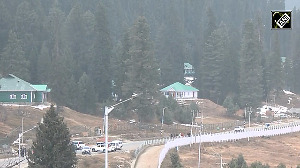Crude oil price had taken a flight from $23.36 in May 2003 to reach $78.22 on August 9, 2006. It went up by nearly 235 per cent in 39 months. Thereafter, it cooled down a bit to reach $56.02 on October 4 -- a 28 per cent fall from its high.
This should have made the government happy because the crude prices came down after it deferred its decision to hike petrol prices. Fear of the American economy slowing down, easing of the tension in West Asia, and huge inventory of oil helped bring the petro prices down.
Although people may not be interested in the crude oil price worldwide, the key question for them will be: will petrol price come down in India with a decrease in the global crude oil prices?
Let's try to understand how prices of crude have behaved over time and how prices of petroleum products are computed in India. This will help us understand petrol price movement in India.
What is Indian Crude Basket?
There are different types of crude oil in the global market. The Indian baskets comprises two kinds of crude oil:
Thus, fluctuation of any crude price globally impacts Indian oil price too. Weighted average price of both types of oil means the price of India's crude basket.
We can understand this through a graph. The graph contains data of petrol, diesel price in India, price of Indian basket and international price of both types of crude oil.
Note: Petrol & Diesel price in Rs (Mumbai price). Crude price is in $ for Brent Dated Sweet Crude. Crude prices may differ for different market and place of trade on any particular date.
Subsidy effect
With the softening of global crude oil prices, India's oil companies have started earning a profit of Rs 2 to Rs 2.25 per litre. Their losses on sale of diesel have almost been wiped off. But they are still making a loss on sale of subsidized kerosene and LPG (liquid petroleum gas).
Several debates have been sparked off over the subsidy on LPG and kerosene. Many reports say the subsidy is not reaching the intended beneficiary. It's not the only worry: the burden of this subsidy is also shared by petrol consumers. This contributes to higher petrol prices.
Tax effect
As known to all, a major portion of the petrol and diesel price goes to the government in the form excise, customer duty, sales tax, et cetera. The total tax on petrol is 115 per cent to 150 per cent of its basic cost in different cities of India.
The difference is mainly because of the differing sales tax rates in different states. Custom duty, excise and sales tax is in percentage to its basic price. This means that with each increase in the price of crude oil, the government benefits. For example, let us assume that the custom duty is 6 per cent. When crude price reached $70 per barrel from $50, government income increased from $3 to $4.2 per barrel. Thus Indians are burdened twice with an increase in crude price worldwide.
Looking at the above factors, it is clear that world crude price is not the only constituent in the Indian petrol price. There are several other factors too that affect it. Then there are other non-financial reasons too that impact petrol prices: like people's reaction, pressures faced by a coalition government, et cetera.
In the end, these are a few questions that will keep cropping up:
- Crude prices have gone up significantly in the last three years but petrol prices in India have risen to that extent. Then if they are almost at their break-even, why were we burdened by heavy petrol and diesel prices when the crude price was low?
- There have been occasional spikes in the global crude price that caused hike in Indian petrol prices. Then why is it that when the global price of crude oil drops, local petrol prices do not go down proportionately?
However, this time the government has taken the right decision of waiting rather than increasing petrol price.

The burning question, however, still remains: When will petrol and diesel prices come down?
The author is a chartered accountant.





